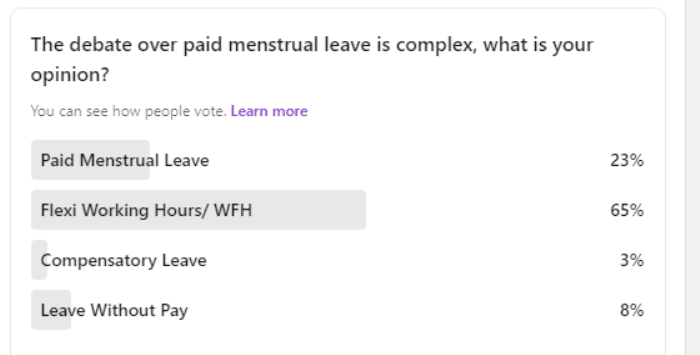
Recently, Minister of Women and Child Development, Honorable Smriti Irani opposed Paid Menstrual Leave and said Menstruation is not a “handicap”, it shouldn’t warrant a specific policy for ‘paid leave’. It can lead women to face discrimination in the workplace.
The debate over paid menstrual leave is complex, there is a complete divide on this issue, few are in support of this statement, and on the other hand, few are against it.
Arguments in Support of Paid Menstrual Leave
The menstrual leave debate revolves around whether women employees should be granted additional leave during their menstrual cycles to address the physical and emotional challenges associated with menstruation.
Those who are in support, argue that menstrual leave recognizes the unique needs of women, promoting gender equality and fostering a supportive work environment. They contend that it enhances productivity and well-being by allowing women to manage their health more effectively.
Arguments Against Paid Menstrual Leave
However, opponents express concerns about potential workplace discrimination and the reinforcement of gender stereotypes. They worry that offering specific leave for menstruation may inadvertently contribute to the perception that women are less capable or dedicated in the workplace.
They also argue that a more comprehensive approach to employee well-being, such as flexible work hours or remote work options, would better address the diverse needs of the workforce.
Survey Report: No Menstrual Leave, Flexi Work Hours, WFH is Enough
SightsIn Plus surveyed on LinkedIn and more than 100 people participated across the industry and locations.

Survey Results
- 65% of employees voted for Flexi Working Hours, No New Leave. (41 Men, 30 Women)
- 23% of employees voted for Paid Menstrual Leave. (10 Men, 15 Women)
- 8% of employees voted for Leave Without Pay. (5 Men, 3 Women)
- 3% of employees voted for Compensatory Leave. (3 Men, 0 Women)
Commenting on the survey page Priya Datar said, “No mensural leave is needed. Flexi hours or optional work from home is more than enough.”
Valentina Balagopal said, “What is wrong with providing leave for menstruation? At least companies should think more about flexibility and support women in work-from-home options during this time”
HR Experts’ Comments
SightsIn Plus reached out to Industry Leaders and HR experts for their opinions on Paid Menstrual Leave. Their views are as below.
Commenting on Survey Results and the Paid Menstrual Leave debate, Prabir Jha, CEO and founder of Prabir Jha People Advisory said, “The politics and emotion of the issue notwithstanding, I think this is now being overdone. On the one hand, we are talking about creating more gender-neutral workplaces, opening doors in areas that were hitherto only for men, and corporates have been liberalizing their leave policies of late.”
“And then we want to create more such policies that may hurt the cause of having more women in the workplace as managers think about workforce planning calculations. So let us know the baby out with the bath water unwittingly.” He added.
Irani Srivastava Roy, Chief Human Resources Officer, Signify India shared her personal views, “I feel that women have an equal footing in all aspects when it comes to men, and menstruation is not a sickness but a way of life for women, and it is best addressed likewise, which in a way means no discriminatory leave for women because of this.”
“Emerging temporary health issues due to this can best be addressed by a flexible approach rather than mandated day off. As women in today’s workforce, while we have to cover a lot of distance to be treated equitably, this in particular is not an issue where we should demand privilege. I am more in favour of shared parental leave, adoption leave, IVF support rather than this issue in particular.” She added.
Expressing her views on the Survey, Rajita Singh, Chief People Officer, Kyndryl India said, “I opine, that corporate and HR policies should primarily focus on nurturing a workplace environment that promotes respect and empowerment, irrespective of gender or identity. When it comes to designing leave policies, considerations such as the size, type of work, cultural perspective, etc of each organization should guide the adoption of a tailored framework.”
“Companies can opt for a mix of flexi-hours, paid leave, compensatory leaves, etc to enable an environment that helps women balance their health and work requirements. At Kyndryl we already provide menstrual and menopausal leave of 2 days per month as part of the sick leave policy.” She added
Final Words
Many organizations have also implemented Menopause Symptoms and Menstrual Leave Policies such as Nike, Unilever, Standard Chartered, Zomato, FlyMyBiz India, Swiggy, Byju’s, and many more companies…
An effective menstrual leave policy should avoid stigmatizing or singling out women. Instead, focus on overall well-being policies, including flexible work hours, remote work options, and health support.
A balanced approach ensures equality and inclusivity, preventing unintended consequences such as potential bias or discrimination.








